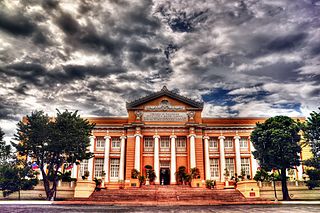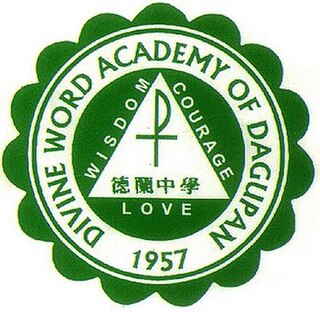
The Ilocos Region, designated as Region I, is an administrative region of the Philippines. Located in the northwestern section of Luzon, it is bordered by the Cordillera Administrative Region to the east, the Cagayan Valley to the northeast and southeast, Central Luzon to the south, and the South China Sea to the west.

Pangasinan, officially the Province of Pangasinan, is a coastal province in the Philippines located in the Ilocos Region of Luzon. Its capital is Lingayen. Pangasinan is in the western area of Luzon along Lingayen Gulf and the South China Sea. It has a total land area of 5,451.01 square kilometres (2,104.65 sq mi). According to the 2020 census, it has a population of 3,163,190. The official number of registered voters in Pangasinan is 1,651,814. The western portion of the province is part of the homeland of the Sambal people, while the central and eastern portions are the homeland of the Pangasinan people. Due to ethnic migration, the Ilocano people settled in the province.

Urdaneta, officially the City of Urdaneta, is a 2nd class component city in the province of Pangasinan, Philippines. According to the 2020 census, it has a population of 144,577 people.
The Divine Word College of Bangued is a private, Catholic higher education institution run by the Philippine Northern Province of the Society of the Divine Word in Bangued, Abra, Philippines. It was founded by a Divine Word Missionary priest in 1920 and given the name Colegio del Sagrado Corazon. In 1964 it was renamed the Divine Word College of Bangued. The college is the most famous in the province.

The Divine Word College of Calapan, also referred to by its acronym DWCC, is a private Catholic basic and higher education institution in Calapan, Oriental Mindoro, Philippines. It is run by the Philippine Central Province of the Society of the Divine Word. It was established by the Divine Word Missionaries in April 1946 and was then called Mindoro Junior College until January 1981. The academic programs offered on its first year of operation were normal education, liberal arts, pre-law, including short term courses in typing and stenography.

The Divine Word College of Laoag is a private Catholic, basic and higher education institution run by the Philippine Northern Province of the Society of the Divine Word in Laoag, Ilocos Norte, Philippines. It was founded by Rev. Fr. Alphonse Mildner, SVD in 1946.
The Divine Word College of Legazpi (DWCL) is a private Catholic coeducational basic and higher education institution run by the Philippine Central Province of the Society of the Divine Word in Legazpi, Albay, Philippines. It was founded by Rev. Fr. Juan Carullo, a retired Army Chaplain in 1947.

The Divine Word Academy of Dagupan (DWAD) is a private, Catholic, basic education institution run by the Philippine Northern Province of the Society of the Divine Word in Dagupan, Philippines. It was founded by the Divine Word Missionaries in 1957. It is one of the few schools in the Philippines that offer an education in Chinese culture in addition to the regular curricula required by the Department of Education (Philippines) and by private schools, in combination with the ideals of a Catholic education.
The Liceo del Verbo Divino, also referred to by its acronym LVD, is a private, Catholic, co-educational basic education institution run by the Philippine Southern Province of the Society of the Divine Word in Tacloban City, Philippines. It was founded by the Divine Word Missionaries in 1929.

The Archdiocese of Nueva Segovia is an archdiocese of the Catholic Church in the Philippines. It covers the province of Ilocos Sur, on the island of Luzon. The see of the archdiocese is the city of Vigan.

Partas Transportation Co., Inc. is a bus transportation company in the Philippines. It operates a 24/7 service for passengers and freight between Metro Manila and northern Luzon, with services also running to the Cordilleras in Baguio, Bangued in Abra, and also to the south Occidental Mindoro. Partas also offers chartered service for tour groups.

The following outline is provided as an overview of and topical guide to the Philippines:

Taxicabs of the Philippines are one of the modes of transportation in the country. They are regulated by the Department of Transportation (DOTr), the Land Transportation Office (LTO), and the Land Transportation Franchising and Regulatory Board (LTFRB). The taxicabs there vary from models and uses. Most taxicabs have yellow colored license plates, taxi signs, LTFRB Registration number, and taximeter, which is mandatory in every cab.

The MacArthur Highway, officially the Manila North Road, is a 684.855-kilometer (425.549 mi), two-to-six lane, national primary highway and tertiary highway in Luzon, Philippines, connecting Caloocan in Metro Manila to Aparri in Cagayan at the north. It is the second longest road in the Philippines, after Pan-Philippine Highway. It is primarily known as MacArthur Highway in segments from Caloocan to Urdaneta, Pangasinan, although it is also applied up to Ilocos Sur, and likewise called as Manila North Road for the entire length.

Viron Transportation Company or Viron Transit is a bus company servicing the Ilocos Region, Philippines. The bus company is owned by millionaire Santiago Rondaris' daughter. It formerly operated as far as the second district of Ilocos Sur but has started to operate as far as Laoag City after the collapse of its related bus company Times Transit.

Leopoldo C. Jaucian is a Roman Catholic Bishop of the Philippines and the current Bishop of Bangued in Abra (Philippines).














